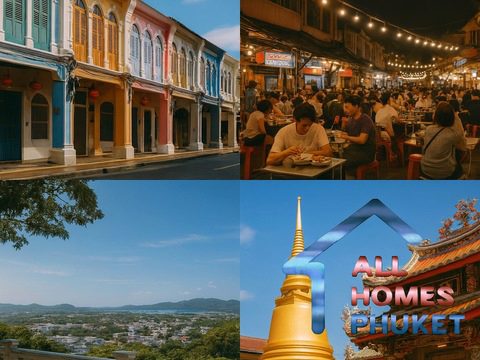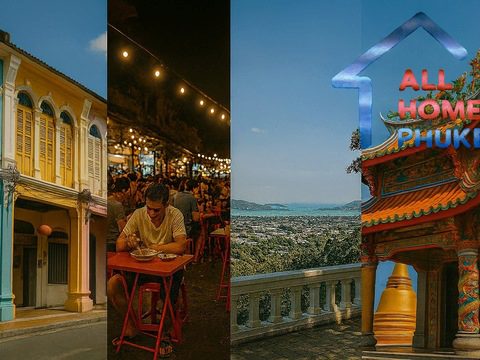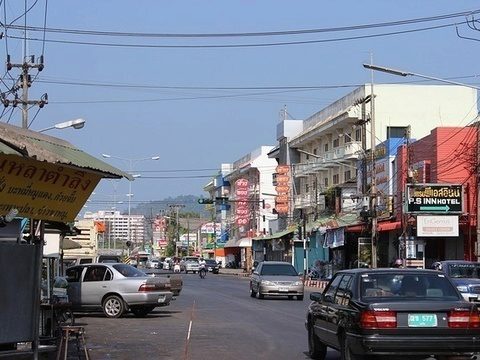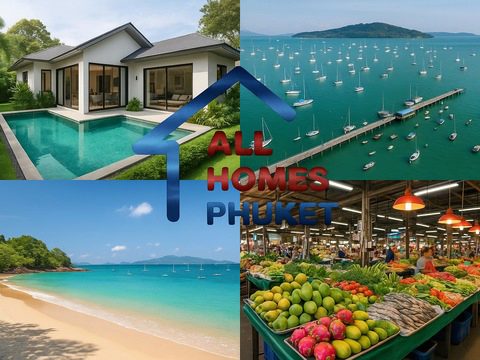Phuket City is a cultural capital and an investment growth point
Part 1. Tourist Guide
Atmosphere and architecture
Antique two-storey Portuguese-Chinese style shopping houses are lined up wall to wall. Pastel facades, carved shutters, balconies with flowers — all this creates a special flavor of the Old Town. Today, coffee shops, art galleries, designer shops and boutique hotels operate inside these buildings.
What to see
Old Town
- Talang, Dibuk and Pang Na streets — 19th century architecture, antique shops, atmospheric cafes.
- Soy Romani is the most photogenic street in the city with pastel houses.
- Krabi Street — Tai Hua Museum and Baan Chinpracha Mansion.
Temples and culture
- Jui Tui Temple is the oldest Chinese temple on the island, especially interesting during the Vegetarian Festival.
- More than 30 temples and sanctuaries throughout the city.
Viewing platforms
- Rank Hill — panoramic view of the whole city.
- Monkey Mountain is an opportunity to see wild macaques.
Parks and entertainment
- Sapan Hin Park — walks and picnics by the sea.
- Butterfly Garden and insect world — for family holidays.
- Weekend Market — street food, clothes, souvenirs.
The gastronomic capital of Phuket
The city is included in the UNESCO list as a “city of gastronomy”. Be sure to try it here:
- Hokkien Mee (seafood noodles)
- Mee Hoon Pa Chang
- O-Aew — dessert with banana jelly
Nightlife
Unlike the bustling Patong, there are chamber bars, live music, art parties and evening markets. Popular places: Dibuk House, Rockin’ Angels, Sunday Walking Street.
Part 2. Investment Guide
Why invest in Phuket City
- Stable year—round rental - Demand is coming from locals, expats, international school staff, and IT professionals.
- Rising prices for historical sites — restored shopping houses have risen in price by 20-30% over the past 5 years.
- Infrastructure development — improvement of the Old Town, new shopping malls, embankment.
- Portfolio diversification — investments do not depend directly on the tourist season.
Prices for 2025 (benchmarks)
- Shopping houses in the Old Town — from 9-12 million baht (150-250 m2, often need investments in repairs).
- Restored houses for business — 15-25 million baht, ready for operation.
- Condominiums at Central Phuket — 3,5–6 million baht for 1-2 bedrooms.
Profitability
- Short—term rentals (tourists) - 7-10% per annum.
- Long—term rental (expats) - 5-7% per annum.
- Commerce (cafes, boutique hotels) — marginality is above 15% with the right concept.
Cases
- Shophouse on Talang Street: bought for 11 million baht, restoration — 2.8 million, leased to a restaurant for 80 thousand baht /month, payback \~5 years.
- Apartment next to Robinson Lifestyle: purchase for 4.8 million baht, long-term lease for 45 thousand baht/month, yield \~6% per annum.
Risks
- Restrictions on reconstruction in the historical center.
- Possible restoration costs are higher than expected.
- Seasonal demand for tourist rentals when choosing the wrong location.
Prospects
- Continuation of the program for the improvement of the Old Town.
- New festival spaces and pedestrian zones.
- Attracting international gastronomic brands and artists.
Phuket City is both ** the “entry point” into the cultural life of the island** and ** an investment platform with a growing capitalization**. If you are looking for stability, long—term growth and a property with character, this area is worth considering.




